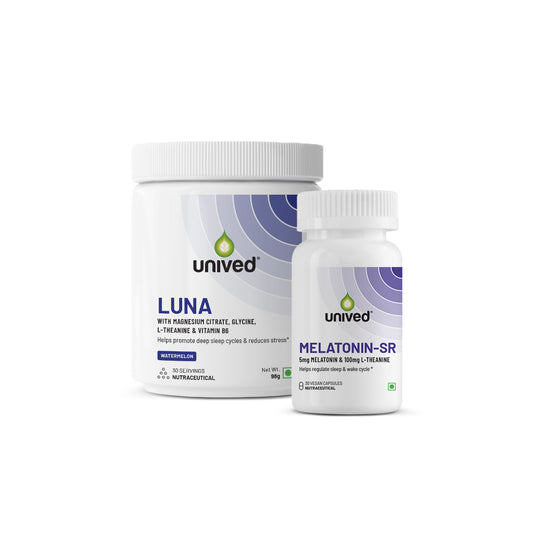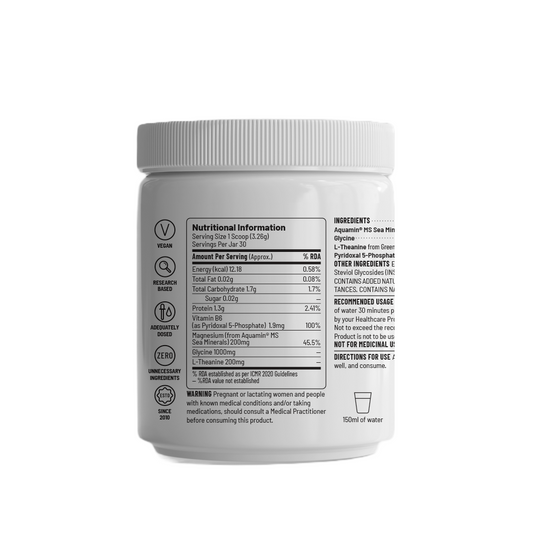Importance of Sleep:
Sleep is an evolutionarily conserved behavioral state in
human beings [1]. Getting adequate, high-quality sleep is vital for health,
cognition, and daytime performance. Most adults need 7-9 hours of sleep per
night to function optimally as sleep plays a crucial role in maintaining
neurological, physiological, and psychological health throughout our lives.
Chronic sleep disorders have been associated with conditions like coronary
heart disease and depression, leading to a potential reduction in the long term
[4]. The necessary or proper quantity and quality of sleep maintains brain,
heart, and immune health as well as aiding in memory consolidation and
restoration of brain function [2]. Humans normally experience sleep cyclically
once a day due to a tightly regulated circadian control.
The relationship between Sleep and Melatonin
Melatonin is a hormone produced naturally in the body at the
center of the brain in an area called the pineal gland which is about the size
of a pea and regulates sleep-wake cycles [2]. Melatonin works to maintain your
body's circadian rhythm by causing drowsiness and lowering body temperature at
night. As daylight fades at night, the body produces melatonin, triggering a
cascade of effects that make you sleepy. Melatonin levels remain elevated
throughout the night, then drop off towards morning as exposure to light
increases, signaling the body to become alert and awake [4].
Disruptions to this cycle can lead to decreased melatonin
which is associated with diminished or misaligned melatonin rhythms, for
example, circadian rhythm-related sleep disorders sleep disorders, and other
issues. For example, lack of exposure to natural light during the day or
exposure to blue light from electronics at night can inhibit melatonin
production, making it harder to fall asleep. Melatonin supplements may help
reset your circadian clock, especially for those with circadian rhythm
sleep-wake disorders or who do shift work [1]. Moreover, the production of the
hormone decreases with age which results in the increased frequency of poor
sleep quality. It has been suggested that melatonin deficit is at least partly
responsible for sleep disorders in the elderly [1].
Melatonin and supplements
Melatonin plays an important role in regulating sleep-wake
cycles and maintaining a proper circadian rhythm. By understanding how
melatonin works and following good sleep hygiene practices, you can support
healthy sleep and daytime wellness.
Melatonin supplements can be useful for certain sleep
disorders and irregular sleep-wake cycles. Melatonin supplements provide an
additional dose of the hormone to help reset your body's internal clock and
establish a normal sleep pattern. Studies show melatonin can help people with
these disorders fall asleep earlier, sleep longer, and feel more awake during
the day [5]. In summary, melatonin supplements are considered very safe for
short-term use and can be effective for certain sleep-wake disorders and jet
lag. However, you should always check with your doctor before starting any
supplement to determine if it's appropriate and the proper dosage for you based
on your medical history and condition.
What is a slow-release melatonin supplement? And its
advantages?
Slow-release melatonin is a type of melatonin supplement
that gradually releases the hormone into the body over a longer period. This
differs from fast-acting melatonin supplements, which release their full dose
of melatonin into the body quickly.
When melatonin is released into the body all at once, as in
fast-acting supplements, it can cause a sudden spike in melatonin levels that
drops off quickly as the supplement is absorbed. This can potentially disrupt
sleep patterns and cause grogginess the next day. Rapid metabolism of melatonin
impacts the long-term bioavailability in the plasma and has a short half-life
of 40-60 minutes.
In contrast, slow-release melatonin formulations are
designed to break down gradually and release melatonin over several hours. This
helps maintain a steady concentration of the hormone over the course of the
night, more closely mimicking the body's natural release of melatonin.
The main advantages of slow-release melatonin are that it
can promote more restful sleep and less interruptions throughout the night. By
maintaining a consistent level of melatonin, slow-release supplements may help
you fall asleep faster and stay asleep longer. They can also reduce the
unwanted daytime sleepiness that some people experience with fast-acting
melatonin.
Overall, slow-release melatonin is thought to provide a more
natural regulation of melatonin levels and a more consistent sleep-wake cycle
compared to fast-acting melatonin supplements.
Our Formulation
Unived’s Melotonin-SR is formulated with Melotonin
slow-release Granules standardized to 5mg Melatonin, 100 mg L-Theanine from
Green Tea extract, and, Magnesium glycinate.
Mode of Action:
- Melotonin-SR offers a unique release profile with a larger
proportion available as immediate-release (within 1 hour) which aids in the
process of falling asleep and is followed by a consistent release over the next
6 hours which contributes to a continuous sound sleep. This unique profile
ensures consistent sustained and sound sleep for 8 hours without side effects.
Melotonin-SR provides a unique sustained-release profile in granular form, with
adequate melatonin release. This enables the individual to fall asleep within
the first hour. Subsequent continuous release then maintains sleep. The
melatonin release then tapers, allowing the individual to complete a
satisfactory sleep cycle without side effects. - L-Theanine: Improve sleep quality through inhibitory
neurotransmitters [7]. - Magnesium glycinate: Magnesium helps promote sleep through
its effects on melatonin secretion, GABA, and glutamate neurotransmitter
activity all of which contribute to the body's natural sleep mechanisms [6]. It
also promotes relaxation and makes one feel less tired which may induce sleep.
Mg with L-theanine potentiates the effect of L-theanine by working
synergistically to sleep by boosting slow-brain waves, regulating brain
electrical activity, and increasing neurotransmitter and GABA receptor levels [7].
References:
1. Gandhi, Avni V., et al. "Melatonin is required for
the circadian regulation of sleep." Neuron 85.6 (2015): 1193-1199.
2. Vasey, Clayton, Jennifer McBride, and Kayla Penta.
"Circadian rhythm dysregulation and restoration: the role of
melatonin." Nutrients 13.10 (2021): 3480.
3. Garcia, Lizeth Soto. "Melatonin and its Effects: The
Truth Behind this Popular Supplement."
4. Zisapel, Nava. "New perspectives on the role of
melatonin in human sleep, circadian rhythms and their regulation." British
journal of pharmacology 175.16 (2018): 3190-3199.
5. Masters, Alina, et al. "Melatonin, the hormone of
darkness: from sleep promotion to ebola treatment." Brain disorders &
therapy 4.1 (2014).
6. Nielsen, Forrest H. "Relation between magnesium
deficiency and sleep disorders and associated pathological changes."
Modulation of Sleep by Obesity, Diabetes, Age, and Diet. Academic Press, 2015.
291-296.
7. Dasdelen, Muhammed Furkan, et al. "A novel theanine
complex, Mg-L-Theanine improves sleep quality via regulating brain
electrochemical activity." Frontiers in Nutrition 9 (2022): 570.

 SaleVendor:Deep Sleep
SaleVendor:Deep Sleep

















